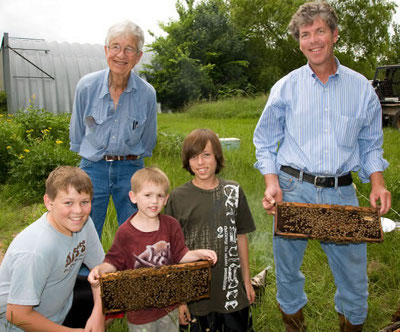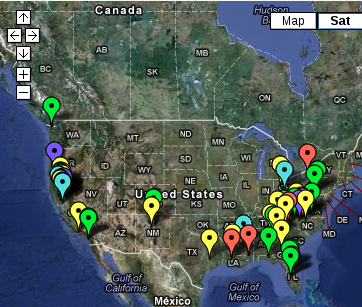
Choosing chemical-free bees
 When we got started with
beekeeping in 2009, learning the basics of conventional beekeeping was
all I could handle. So I did what my neighbors did and bought
random package bees, figuring they were all about the same.
When we got started with
beekeeping in 2009, learning the basics of conventional beekeeping was
all I could handle. So I did what my neighbors did and bought
random package bees, figuring they were all about the same.
Then we started losing
hives and I realized that what I was aiming for --- natural,
chemical-free beekeeping --- isn't really possible with run-of-the-mill
honeybees. We're starting from ground zero again, which gives me
the opportunity to use a better bee.
Survivor
bees are one
intriguing option. BeeWeaver has been raising honeybees
entirely without chemicals for ten years. They actually started
weaning their bees off the drugs years before, but couldn't quit cold
turkey or they would have gone bankrupt. The price tag is steep
--- $130 plus shipping for a package --- but the real reason I haven't
clicked the "buy" button yet is because the company is located in
Texas. I'm just not sure whether southern bees would do well in
our climate.
VSH bees are the U.S. government's
solution to chemical-free varroa mite control. The Baton Rouge
Bee Lab discovered a strain of honeybee in which the workers
industriously remove any brood infected with varroa mites. The
Lab has sold VSH  queens to commercial apiaries
--- see this map for locations of facilities
selling VSH (and other types of resistant bees.) I'm intrigued by
this option (especially since there are local sources), but I'm not
sure whether being resistant to varroa mites is enough. Will
these VSH bees die of colony collapse disorder or any of the dozen
other bee plagues?
queens to commercial apiaries
--- see this map for locations of facilities
selling VSH (and other types of resistant bees.) I'm intrigued by
this option (especially since there are local sources), but I'm not
sure whether being resistant to varroa mites is enough. Will
these VSH bees die of colony collapse disorder or any of the dozen
other bee plagues?
Russian
bees came from an
earlier government program that imported mite-resistant bees from
Russia. The main problem with Russian bees appears when they
hybridize with other bees and the offspring turn mean. I'm not
sure whether I'm willing to focus my efforts entirely on Russian bees,
and I don't think it's a good idea to have a Russian hive and a
different type of honeybee in the same area.
Feral
bees would be the
very best option since honeybees that have survived without beekeepers
for generations are likely to continue to do so in our apiaries.
However, it's tough to find feral bees at the moment, and when you do
find them, you can't be sure they're not a first year swarm from some
neighbor's chemical-treated hive.
I'd be very curious to
hear anyone's thoughts on these bee options. At the moment, I'm
tempted to order one package of survivor bees from BeeWeaver and one
package of VSH bees from somewhere more local. Thoughts?
Want more in-depth information? Browse through our books.
Or explore more posts by date or by subject.
About us: Anna Hess and Mark Hamilton spent over a decade living self-sufficiently in the mountains of Virginia before moving north to start over from scratch in the foothills of Ohio. They've experimented with permaculture, no-till gardening, trailersteading, home-based microbusinesses and much more, writing about their adventures in both blogs and books.
Want to be notified when new comments are posted on this page? Click on the RSS button after you add a comment to subscribe to the comment feed, or simply check the box beside "email replies to me" while writing your comment.

While your comment "when you do find them, you can't be sure they're not a first year swarm from some neighbor's chemical-treated hive" is true, on the flip side there's a decent chance it's a non-first-year swarm from a lazy neighbor's non-chemical-treated hive --- since the lazy neighbor's hives are both more likely to swarm and more likely to be non-chemical treated.
My first hive was from a swarm; and while they don't seem as friendly/calm as the ones in the picture you put on this article's page, they do seem to have decent survival skills.
If I find a swarm, I'm definitely nabbing it, no matter where it comes from. I'm just not so sure I'm likely to find one.
I'm just not so sure I'm likely to find one.
I wouldn't mind a little defensiveness either if the bees had good survival traits!
I live in Mississippi and it seems that many people in this area have had some success with Russians. However, like you mentioned, you have to really stay on top of your hives to ensure that a new non-Russian queen doesn't replace your old Russian queen. I'll be starting my first hive this year with Russians obtained from a local beekeeper so hopefully they will do well for me.
On an unrelated note, I really enjoy your blog. Keep up the good work!
Interesting to hear firsthand about Russians --- I'd read about them, but never talked to anyone who used them. I hope you'll check back and let us know how your experiment goes!
Thanks for the kind words about the blog!
I am in central Minnesota and have great sucess with the five packages of bees I got from beeweaver last year. They can be a little testy at time and will let you know when they don't want company. I also have a separate yard of five Russian colonies that are gentle , hardy and good honey production. I am keeping them isolated for the reason you mentioned about cross breeding.
I have exclusively used bees from BeeWeaver since I started keeping bees 6 years ago in Charlotte & Lake Lure, NC. They're very good bees and their customer service is second to none! Good honey production, very mild temper and of course I've never given them any chemical input...at all, ever! It truly is like I hear old timers tell about keeping bees in the old days before all the disease & pest problems.
FYI, I started with one BeeWeaver package and have made splits with new BeeWeaver queens since then to build up to my now 13 hives. I also requeen every August as a management practice.
I did buy two local queens in a pinch this spring from a very reputable source. Both were superceeded within three weeks of installation. Not what I expected. But the supersedure queens are doing quite well...likely they have half BeeWeaver genetics, since my bees pretty well saturate the area.
I highly recommend BeeWeaver. If you have any questions, Laura Weaver is amazingly responsive and cheerful to boot!
I have no connection to BeeWeaver, other than being a very satisfied customer.
With 13 hives, I now feel I can start breeding a few queens next year to see if I can move toward a more sustainable apiary...we'll see!